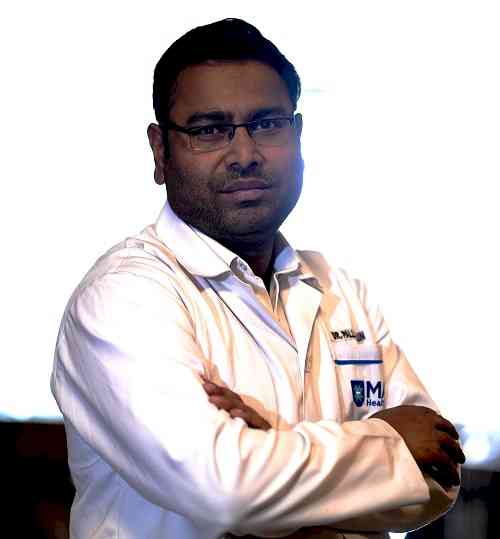Reconstructive Surgery in Oral Cancer: Restoring Function and Aesthetics
The diagnosis of oral cancer is a life-altering event that not only poses a threat to a patient's health but also raises challenges related to appearance and functionality. The impact of oral cancer extends beyond the initial treatment phase, often leaving individuals with significant impairments in speech, eating, and facial aesthetics. Reconstructive surgery emerges as a vital component in the comprehensive management of oral cancer, offering a pathway to restore both form and function for patients on their journey to recovery.

by Dr Nikhil Mehta, Consultant Surgical Oncologist, HCG Cancer Centre, Jaipur
The diagnosis of oral cancer is a life-altering event that not only poses a threat to a patient's health but also raises challenges related to appearance and functionality. The impact of oral cancer extends beyond the initial treatment phase, often leaving individuals with significant impairments in speech, eating, and facial aesthetics. Reconstructive surgery emerges as a vital component in the comprehensive management of oral cancer, offering a pathway to restore both form and function for patients on their journey to recovery.
The Multidimensional Challenge of Oral Cancer
Oral cancer, encompassing malignancies of the lips, tongue, cheeks, floor of the mouth, and hard palate, presents a unique set of challenges for both patients and healthcare providers. Beyond the primary goal of eradicating the cancerous growth, preserving or restoring normal oral function and aesthetics becomes paramount. Traditional treatments, such as surgery, radiation therapy, and chemotherapy, may significantly impact the structures and tissues in and around the oral cavity.
Functional Implications
One of the primary concerns in oral cancer treatment is the potential loss of essential structures, such as the tongue or jaw. Such losses can lead to difficulties in speech articulation, mastication, and swallowing. Reconstructive surgery aims to address these functional deficits by rebuilding and restoring the anatomy of the oral cavity. Techniques such as microvascular reconstruction, where tissue from another part of the body is transferred to the oral region, play a pivotal role in reconstructing complex defects, ensuring optimal functionality.
Aesthetic Considerations
Beyond the functional aspects, the aesthetic consequences of oral cancer surgery can profoundly impact a patient's self-esteem and quality of life. Facial disfigurement resulting from extensive surgery can lead to social and psychological challenges. Reconstructive procedures not only focus on rebuilding the structures but also on restoring a natural and aesthetically pleasing appearance. The goal is to empower patients to regain confidence in their physical appearance, fostering a positive mindset during the recovery process.
Advanced Techniques in Reconstructive Surgery
Advancements in surgical techniques and technology have revolutionized the field of reconstructive surgery in oral cancer. The use of three-dimensional imaging, virtual surgical planning, and innovative materials have enhanced precision and outcomes. Computer-aided design and manufacturing (CAD/CAM) technologies allow for the creation of customized implants and prosthetics, ensuring a tailored approach to each patient's unique anatomy.
Team Approach to Comprehensive Care
The complexity of oral cancer management necessitates a multidisciplinary approach. Surgeons, oncologists, dentists, and rehabilitation specialists collaborate to provide comprehensive care. Reconstructive surgery fits seamlessly into this framework, offering a solution that goes beyond cancer eradication. Speech therapists and oral rehabilitation specialists often work in tandem with reconstructive surgeons to optimize postoperative functional outcomes.
Postoperative Rehabilitation and Support
The journey of recovery extends beyond the operating room. Postoperative rehabilitation is a critical phase in the restoration of oral function. Patients often undergo speech therapy, physical therapy, and dental rehabilitation to regain optimal function. Psychosocial support is equally important, addressing the emotional challenges associated with the physical changes resulting from cancer and its treatment.
Reconstructive surgery in oral cancer represents a beacon of hope for patients facing the dual challenges of functional impairment and altered aesthetics. Beyond the eradication of cancer, the focus shifts towards rebuilding lives, both physically and emotionally. The strides we continue to make in surgical techniques and comprehensive care reaffirm our commitment to restoring function and aesthetics, empowering our patients on their journey to recovery.


 City Air News
City Air News 





